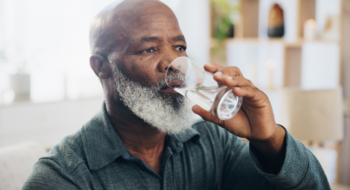Aging is part of life, but the choices we make along the way can make a big difference in how well – and how long – we live.
One of the most important steps women can take is to benefit from routine health screenings, which can play a crucial role in catching health concerns before they become more serious, says Tidelands Health OB-GYN Dr. Valerie Lasry, who practices at the Murrells Inlet and Georgetown locations of Tidelands Health OB/GYN.
Routine screenings should typically include pap smears to check for cervical cancer, mammograms for breast cancer and bone density tests for osteoporosis. Middle-aged women should also be tested for colorectal cancer, diabetes, hearing and vision problems.
Dr. Lasry says the frequency of screenings can vary by person depending on family history and previous illnesses. Women who have a history of normal pap smears, for example, may opt to get the test every three years rather than annually. After a decade of normal pap smears leading up to age 65, woman may opt to stop the tests altogether, she says.
A similar approach is recommended for other conditions such as osteoporosis.
“If a woman has certain risk factors, such as being thin, a history of smoking or is experiencing premature menopause, we recommend getting a baseline test in their mid-50s, then being tested again every two to three years,” Dr. Lasry says.
Diet and exercise can play a vital role in how well women age, especially when it comes to maintaining bone density. Getting the proper levels of calcium and vitamin D can help guard against bone loss. Resistance exercise is important, as well.
When it comes to diet, women should focus on the concept of “eating the rainbow,” which refers to including the full color spectrum of fruits and vegetables in your meals — red tomatoes, green beans, yellow squash, blueberries and the like. The colors reflect different phytonutrients, vitamins and antioxidants the plants produce that our bodies can use to power and repair themselves.
Enjoying this story? It’s free to republish. Learn more.
A good diet should also include leafy greens such as kale or collards along with sources of fiber to reduce blood sugar and maintain a healthy gut. Heart-healthy meats such as tuna, salmon and chicken should also be on the menu for most women, along with healthy oils such as olive, avocado and canola.
Vegetarian? No worries, says Dr. Lasry. There are plenty of ways to get the nutrients you need on a plant-based diet.
“You don’t need to have a meat diet to have good nutrition,” she says.
Obesity remains a major complicating factor for many women along the Grand Strand, Dr. Lasry says. That can make it even more important to follow a healthy diet to fend off health conditions such as Type 2 diabetes.
Physical exercise can become more taxing on our bodies as we age, but it remains a crucial part of keeping our hearts, lungs, muscles, bones and even our brains healthy.
Women moving through middle age may find they need to change the way they exercise – moving from high-impact sports such as running to low-impact options such as swimming or yoga, allowing women to reduce wear and tear while still enjoying the benefits of a workout.
“Cardiovascular health, bone health, keeping your balance – exercise helps with a lot of things,” Dr. Lasry says. “If your muscles are strong, you’re going to be less likely to fall.”
While you’re exercising your body, don’t forget to exercise your brain, as well. Completing puzzles, playing games such as chess, reading or learning to play a musical instrument – these are all the kinds of mental challenges that can keep your mind active and support brain health.
“It’s important to stimulate your brain in as many ways as possible to stay as sharp as possible for as long as possible,” Dr. Lasry says.
Above all, aging gracefully means following your doctor’s advice, including taking prescribed medications and, importantly for smokers, quitting tobacco.
“Smoking is linked to cervical cancer, colon cancer and lung cancer,” Dr. Lasry says. “It’s probably one of the worst things you can do for yourself.”
If you have any questions or need advice, don’t hesitate to reach out to a qualified care provider for guidance.







